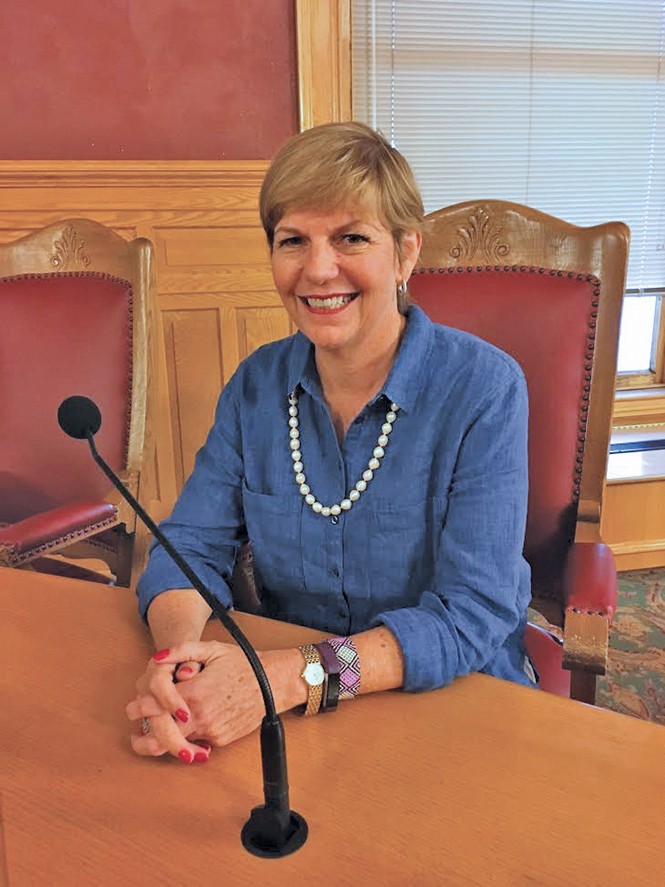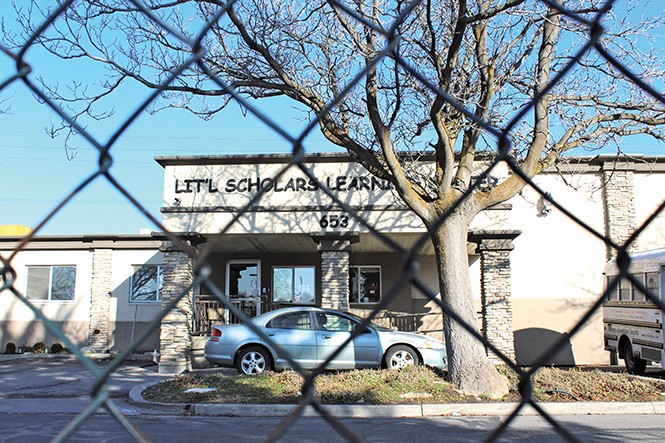Enthusiasm Sustained
Two Salt Lake City councilmembers call it quits, look ahead to next chapter.
By Dylan Woolf Harris @dylantheharrisLisa Adams' constituents were furious.
Late last year, feeling initially blindsided and beside themselves, neighbors in a quiet, working-class section of Sugar House bristled at the city's surprise announcement that a new homeless shelter was moving nearby. It was the beginning of a grassroots protest that would drag on for two months. Aiming to cool tensions, Salt Lake City Councilwoman Adams ventured out on a freezing December day, knocking on doors while holding a FAQ fact sheet. She thought maybe she could assuage their anger through face-to-face outreach—at least by explaining the city's vision.
Still, the outrage was so volatile that a police officer escorted Adams just to ensure her safety. Met with anger, Adams says neighbors should have been warned beforehand to avoid the need for post-announcement damage control: "I got yelled at," she admits. "But it was OK."
Ask Adams whether she has any gleaming regrets over her nearly four years on city council, and she'll tell you about her initial support to build a new homeless resource center on Simpson Avenue. But that's not necessarily because of the bitter reaction.
Adams, who represents District 7, which encompasses the southeastern portion of the city and most of Sugar House, says her support was contingent on the facility being designated for women and children only. Details that surfaced later, however, made her change her mind.
"Once I got the rest of the information, I thought, 'This is a bad idea,'" she says. She didn't realize, for example, that nearby tenants had long-term leases, and she didn't know initially how much the shelter would cost. "There aren't enough families that we need a $15 million shelter just for families," she says.
Soon after, she rescinded her support, and amid unabating opposition, the city decided to scrap the location. It was a challenging—but memorable—public-servant lesson, Adams observes.
While the city moves forward tackling homelessness, Adams will soon be watching from the sidelines.
She and District 3 Councilman Stan Penfold are the two council incumbents who decided against seeking re-election. Their successors will be selected at balloting on Nov. 7. As their time on the council comes to an end, both reflect on their tenures.
Adams looks at her track record proudly. "It was really important to me to improve things in terms of police presence in District 7," she says. "I'm really happy that we've been able to do that, particularly with bringing back the bike squad."
Elected in 2013, she notes that the job has a steep learning curve. She didn't fully understand, for example, the different roles of the council and mayor's office, which both she and Penfold said seems to be a common misunderstanding among newly elected officials and their constituents. "If I want a street repaved, we can provide the money," she says, for example, "but the mayor can decide to take the money and use it somewhere else."
Watching the continued growth and new S-Line train through Sugar House, Adams reasoned that a centralized police station wasn't cutting it, and she championed bringing back bicycling cops to the neighborhood. "Now there's a plan to put a police precinct in District 7," she adds.
Along with her initial support for the Simpson Avenue homeless shelter, Adams took a few hits for opposing a failed recreation bond two years ago. But, in the latter case, it's a decision she stands by because of the estimated $120 million price tag that would have been paid for through an uptick in property taxes to homeowners but wouldn't have covered long-term maintenance.
"It would buy us all this cool stuff, but you can't use bond money for operations and maintenance—so we'd have all this great stuff but no way to make sure that in 10 years it's not falling apart," she says.
In the last year, homelessness has been a recurring issue facing the city, and Adams agrees with the broad, scattered-site plan that will eventually lead to the closure of the downtown Road Home shelter. If the homeless population is broken up, she says, helping them get the specific services they need is manageable. The plan has been contentious, though, because residents worry that the drug market that plagues downtown, and criminals who had embedded among the city's most destitute, would relocate with the resource centers. Adams contends that won't be the case. "We aren't trying to replicate [Rio Grande]," she says. "We're trying to break it down into smaller bites."
Adams says she wasn't expecting homelessness to occupy so much of the council's agenda this year, but she isn't surprised that it did.
"One thing I've learned on the council is that at the beginning of the year, we set our priorities and we decide we are going to work on those things," she says. "Inevitably, something bubbles to the surface that had not been on our radars, that consumes an inordinate amount of time."
A couple years ago, she remembers, the city found itself in an unplanned and ongoing debate about the fate of city-owned golf courses. The issue caused rifts among elected leaders, as well as residents who divided down the lines of golfers and those who wanted to use the green space for something else.
As it is, Adams acknowledges the precarious relationship council members have with Salt Lake City Mayor Jackie Biskupski. She says a large part is based on communication obstacles. "The mayor wants to speak through her people," Adams says. "I will text her directly, and occasionally I get a response, and I appreciate it when I do."
She hopes the incoming council will work to nurture better lines of dialogue. Penfold, who has been on the council dais since 2010, largely agrees. He says the legislative side tends to move at a deliberate pace, whereas the mayor's office expects swift action.
"The council as a body has a good history of being transparent," he says. "The speed the administration wants to move is fast. We want to make sure that the community understands what we're doing."
The process can sometimes lead to failed measures. Earlier this year, Biskupski nominated Sen. Jim Dabakis, D-Salt Lake City, to serve on the UTA board as a city liaison. But the council rejected her pick. "We really aren't necessarily interested in someone who was going to fight with UTA; we want someone who can represent the needs of the residents, and there aren't any members on the board currently who are actually users of the system, and that was really important to us," Penfold says.
Penfold is swift to clarify that his relationship with the mayor's office wasn't always complicated. In fact, it was former mayor Ralph Becker, a longtime friend to Penfold, who encouraged him to run when Councilman Eric Jergensen's seat opened up.
"He called me on a Friday and said, 'I want you to think about this.'" Penfold said he'd consider it, to which Becker responded: "Well, you have to think about it really fast because filing ends on Tuesday."
The encouragement was enough for Penfold, who had a history of working in his neighborhood to reduce speeding. Among his goals, Penfold wanted to improve the city's public transportation. He supported the idea of connecting bus stops along the core Trax infrastructure, which, he says, was great at getting commuters downtown or to the University of Utah, but not at getting people efficiently from one neighborhood to the next.
Instead, he says, the system got worse.
"I got in just as the recession was starting. We had two really horrible years for the city budget, and at the same time, UTA lost all their sales tax, so they scaled back all their bus services," he says.
Now, years later in a recovered economy, he's still not satisfied with public transit services within the city. He foresees the issue could be taken up by community councils. Penfold also thinks the relationship between the city council and the advisory neighborhood councils should improve.
"Community councils are an interesting sort of beast. They tend to organize well around problem issues," he says, citing crime along State Street as one example.
When Penfold initially engaged with his neighborhood council, the city offered support in the form of staff, training and a regular neighborhood conference. Regrettably to Penfold, the connection faded over time. "I think it's time to develop a new supportive relationship with them," Penfold says. "Especially with so many new people coming into the city. I think there's going to be a growing need for people to be engaged in the city."
As a councilman, Penfold is proud of the city successfully changing liquor ordinances. At one time, Salt Lake City was more restrictive than the state, only allowing for two alcohol establishments per block face; the council lifted the restriction, and downtown flourished with new bars and restaurants. In addition, some neighborhoods outright banned bars, so the council voted to allow alcohol establishments in business zones. Avenues Proper, Penfold remembers, was the first bar in a residential neighborhood.
"Everyone was really afraid that neighborhoods were going to go in the toilet if we have bars. People didn't understand what it would look like," he says.
Penfold also adds to his track record his support for the downtown Eccles Theater, despite contention surrounding it.
"There was a lot of fear about a new theater in town. There were a lot of arts organizations in particular that thought it was going to hurt the arts. Some people were upset about investing that much money. There were a lot of challenges and concerns. It survived a lot of close votes, 4 to 3 votes," he says. "Of course, now, everybody sees it as a huge success."
Despite what he deems an accomplished run, Penfold decided not to seek another term.
In a Salt Lake Tribune article published last March, Penfold was criticized by a former employee of the Utah AIDS Foundation who accused him of failing to split his time between his duties as its director and his council responsibilities.
Penfold says that neither the article nor the accusation influenced his decision. He chalks up his announcement and the article's publication as bad timing. Leaving the council was a decision he'd been considering since January, he says, and "pretty much" reached it the following month.
Adams decided to walk away before she lost all her steam.
"I don't know that I could sustain the enthusiasm that I've had for four more years. I'd much rather end when I feel like I've accomplished some good things, stuff I'm proud of; and that I'm sprinting across the finish line instead of crawling," Adams says.
District 3 voters will choose whether Phil Carroll or Chris Wharton will be Penfold's successor; the decision for District 7, Adams' area, is between Amy Fowler and Abe Smith. District 1 incumbent James Rogers is being challenged by David Atkins, and in District 5, George Chapman is running against incumbent Erin Mendenhall.
Neither Penfold nor Adams is sure what's next. Adams says she probably won't run for office again.
Asked if he'd consider a mayoral run, Penfold laughs at the idea before he answers in earnest: "Never say never."
More by Dylan Woolf Harris
-
Dabakis Is Leaving the Building
Ever boisterous and outspoken, state senator says lending liberal voice trumps his bill tally.
- Apr 4, 2018
-
Gagged and Bound
Row between South Salt Lake and muralist gets the burlesque treatment.
- Mar 21, 2018
-
Inland Port Authority Update
Gov. Herbert signs contested bill into law.
- Mar 16, 2018
- More »
Latest in News
Readers also liked…
-
Raise a glass for E.L.T Harrison, architect of the Beerhive building on Main
Small Lake City
- Oct 11, 2023







